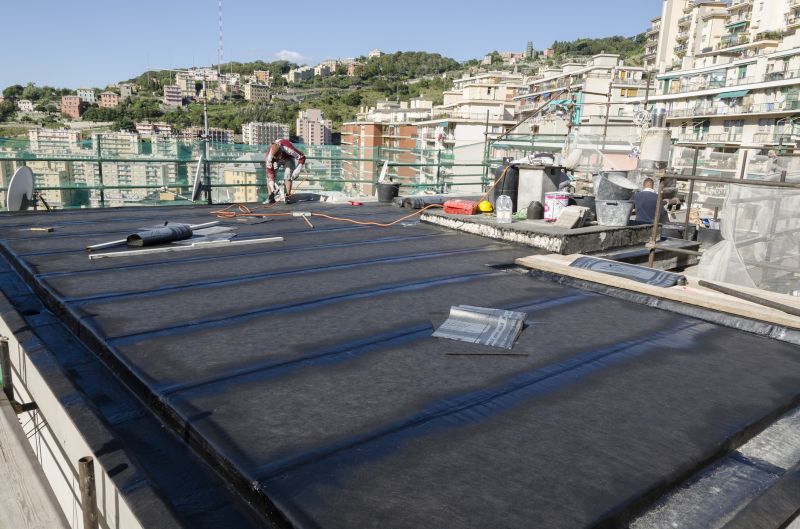Top-Rated Products For Roofing Service Projects
Identify essential tools and materials that support successful roofing installations and repairs for service providers.
 In Somerset County, New Jersey, maintaining and repairing roofing systems requires a diverse range of specialized products designed to address various aspects of roofing service. From initial inspections and surface preparations to repairs and final coatings, the right tools and materials are essential for achieving durable and effective results. Roofing professionals often rely on a combination of durable hardware, weather-resistant materials, and safety equipment to ensure the integrity of the roof and the safety of the crew. Understanding the different product categories available can help contractors and DIY enthusiasts select the most appropriate items for their specific project needs.
In Somerset County, New Jersey, maintaining and repairing roofing systems requires a diverse range of specialized products designed to address various aspects of roofing service. From initial inspections and surface preparations to repairs and final coatings, the right tools and materials are essential for achieving durable and effective results. Roofing professionals often rely on a combination of durable hardware, weather-resistant materials, and safety equipment to ensure the integrity of the roof and the safety of the crew. Understanding the different product categories available can help contractors and DIY enthusiasts select the most appropriate items for their specific project needs.
Top Overall Option
Heavy-Duty Roofing Fasteners
Heavy-duty roofing fasteners are essential for securing various roofing materials, including metal panels, shingles, and membranes. They are designed to withstand high wind loads and harsh weather conditions, providing a reliable hold over time. These fasteners come in different lengths and coatings to match specific roofing materials and environmental requirements, ensuring durability and corrosion resistance. Proper selection and installation of fasteners contribute significantly to the overall stability and longevity of a roofing system, making them a critical component for any roofing project in Somerset County, NJ.
Types of Products For Roofing Service
Roofing Shingles
Various materials and styles suitable for residential and commercial roofing projects, offering protection and aesthetic appeal.
Roofing Membranes
Waterproof and vapor barriers used in flat and low-slope roofing applications to prevent leaks.
Roof Coatings
Protective layers applied over existing roofs to extend lifespan and improve weather resistance.
Flashing and Sealants
Materials used to seal joints and edges, preventing water infiltration around chimneys, vents, and skylights.
Roofing Nails and Fasteners
Specialized fasteners designed for securing shingles, panels, and membranes securely in place.
Roofing Underlayment
Protective layers installed beneath shingles or panels to provide an additional barrier against water infiltration.
Roof Ventilation Products
Vents and fans that help regulate airflow within the attic space, reducing moisture buildup and temperature extremes.
Safety Equipment
Harnesses, anchors, and fall protection gear essential for safe roofing operations.
Roofing Tools
Specialized tools such as roofing shovels, nail guns, and cutting tools to facilitate installation and repairs.
Gutters and Downspouts
Components designed to direct water away from the roof and foundation, preventing water damage.
Roof Inspection Cameras
Devices used for detailed inspections to identify issues that are not visible to the naked eye.
Popular Choices
Widely used for residential roofing, offering a range of styles and colors suitable for various aesthetic preferences.
Durable and long-lasting, these panels are favored for their resistance to weather and fire.
Commonly used in flat roofing applications for their ease of installation and waterproof properties.
Convenient for applying protective layers that can help extend roof life and improve weather resistance.
Popular for maintaining proper attic ventilation and preventing moisture buildup.
Used to seal minor leaks and joints, helping to prevent water ingress.
Essential for providing an additional waterproof barrier beneath shingles or panels.
Commonly used safety gear that helps protect workers during roofing tasks at heights.
Power tools that facilitate quick and secure fastening of roofing materials.
Increasingly popular for detailed inspections without the need for invasive procedures.
Roofing projects typically begin with thorough inspections, which may involve the use of specialized cameras or moisture meters to identify hidden issues. Surface preparation products such as primers and cleaning agents are then used to ensure proper adhesion of roofing materials. During installation or repair, various fasteners, sealants, and flashing components are employed to secure materials and prevent leaks. For ongoing maintenance, protective coatings and weatherproofing membranes help extend the lifespan of roofing systems, especially in areas prone to harsh weather conditions.
Safety is paramount in roofing work, and the selection of appropriate safety equipment like harnesses, anchors, and fall protection systems can make a significant difference in preventing accidents. Additionally, roofing tools such as nail guns, roofing shovels, and cutting tools aid in efficient project completion. The combination of high-quality products and proper techniques ensures that roofing services are performed effectively, providing long-lasting results for property owners in Somerset County and beyond. Staying informed about the latest products and innovations in roofing supplies can help professionals deliver reliable service tailored to the specific demands of each project.
Key Buying Considerations
- Compatibility with existing roofing materials to ensure proper installation.
- Weather resistance features suitable for Somerset County's climate conditions.
- Durability and lifespan of the product to match project expectations.
- Ease of installation and whether specialized tools or skills are required.
- Corrosion and rust resistance, especially for metal components.
- Compatibility with safety equipment and ease of handling.
- Availability of warranties or guarantees from suppliers.
- Cost and overall value relative to project scope and quality.
- Environmental conditions such as wind, rain, and snow exposure in the area.
- Compliance with local building codes and standards.
- Product reviews and reputation among industry professionals.
- Weight and size considerations for handling and transport.
- Compatibility with other roofing accessories and systems.
- Potential for future upgrades or modifications.
